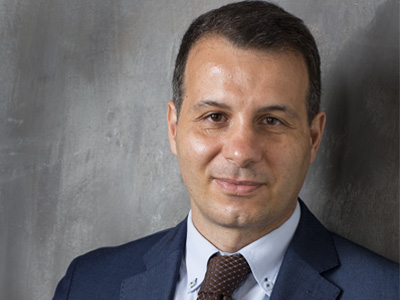A turning point in Davide’s career came during his time at MIT Sloan Executive Education, where he earned an Executive Certificate in Strategy and Innovation. “It gave me the tools to think long-term and structure complex change,” he says, crediting courses like Understanding Global Markets: Macroeconomics for Executives with sharpening his ability to anticipate economic shifts and make informed investment decisions.
Earlier in his career, as MD and VP of Sales & Marketing at Unifill (part of the Elopak Group), Davide led strategic planning and commercial expansion during a period of intense M&A activity. Those experiences, combined with his MIT training, reinforced a bifocal approach to innovation: balancing long-term strategic thinking with an urgency around digital transformation.
One of Davide’s recent areas of focus has been the digitalization gap facing Europe and Italy. Drawing on market data and global trends, he has written extensively on the importance of accelerating digital progress to remain competitive in a tech-driven economy. In his Italian-language publication Meteore, he reflects on what it will take for these regions to close the gap with countries like the U.S., China, and Japan.
But innovation, in Davide’s view, isn’t only about systems and strategy—it’s about people. At G. Mondini, he has prioritized building cross-functional teams, dismantling organizational silos, and cultivating a culture rooted in kindness and continuous learning. “I believe that the power of personal connection underpins true success—going far beyond technical excellence.”

His approach is grounded in both research and experience. Studies in social psychology support the idea that leaders who invest in strong relationships drive better outcomes. And Davide’s real-world results—recognized by Forbes Italy and the National Association of Manufacturers—underscore that connection and performance go hand in hand.
When it comes to change management, Davide emphasizes the importance of starting with a deep understanding of an organization’s unique context—its people, processes, products, and markets. From there, he advocates for clear, measurable roadmaps tied to quarterly goals, backed by engaged leadership and empowered teams. “Change initiatives fail when people don’t believe in the vision or don’t know how to execute on it,” he says. “That’s why alignment and transparency are critical.”
At the heart of his leadership philosophy are two essential ingredients:
- Commitment from the top – A shared, long-term vision from shareholders and senior leaders.
- A team of changemakers – People who are not only capable, but truly motivated to drive transformation.
Davide’s holistic view of leadership blends operational excellence with human values. For him, the modern manager’s role is not just to drive growth, but to create an environment where people thrive. That means focusing on productivity—not just in terms of output, but in how work adds value—and distinguishing between essential work and the inefficiencies that hold teams back.
In an era defined by uncertainty—climate challenges, geopolitical shifts, digital disruption—Davide’s integrated approach stands out. He reminds us that successful transformation requires more than cutting-edge tools. It takes clarity, compassion, and the courage to lead with both head and heart.








